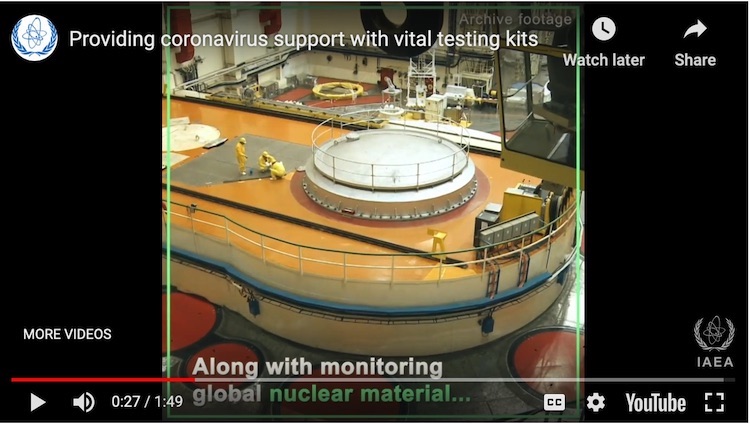By Reinhard Jacobsen
VIENNA (IDN) – Responding to requests for support from around 90 Member States in controlling an increasing number of infections worldwide, the International Atomic Energy Agency (IAEA) is dispatching a first batch of equipment to more than 40 countries to enable them to use a nuclear-derived technique to rapidly detect the coronavirus that causes COVID-19.
Also known as the UN nuclear watchdog, the IAEA said that several countries have shown strong support for this emergency assistance and announced major funding contributions for the IAEA’s efforts in helping to tackle the pandemic.
The agency said that dozens of laboratories in Africa, Asia, Europe, Latin America and the Caribbean will receive diagnostic machines and kits, reagents and laboratory consumables to speed up national testing, which is crucial in containing the outbreak. They will also receive biosafety supplies, such as personal protection equipment and laboratory cabinets for the safe analysis of collected samples.
In the coming weeks, IAEA will be providing further deliveries of equipment to the growing number of countries seeking assistance.
“IAEA staff are working hard to ensure that this critical equipment is delivered as quickly as possible where it is most needed,” said IAEA Director General Rafael Mariano Grossi. “Providing this assistance to countries is an absolute priority for the Agency.”
The IAEA is using its own resources as well as extrabudgetary funding for its emergency COVID-19 assistance. Member States have so far announced more than €9.5 million in extrabudgetary financial contributions to the IAEA for this purpose, including US $6 million from the United States, CAD $5 million from Canada and €500 000 from the Netherlands. Australia has also made an important contribution. In addition, China has informed the IAEA about donations of detection equipment, kits, reagents and other medical materials worth US $2 million and provision of expert services.
“I am very grateful to the Governments of the United States, Canada, China, the Netherlands and Australia for their generous contributions,” said Mr Grossi. “I encourage others to contribute to this effort so that we can continue to swiftly respond to the growing demands from our Member States.”
After his telephone conversation with the Director General of the World Health Organization (WHO), Tedros Adhanom Ghebreyesus, Mr Grossi said the IAEA is taking concrete and coordinated action to support global efforts against the pandemic. The IAEA is now also part of the UN Crisis Management Team on COVID-19.
The first batch of supplies, worth around €4 million, will help countries use the technique known as real time reverse transcription-polymerase chain reaction (real time RT-PCR). This is the most sensitive technique for detecting viruses currently available. The nuclear-derived DNA amplification method originally used radioactive isotope markers to detect genetic material from a virus in a sample. Subsequent refining of the technique has led to the more common use today of fluorescent markers instead.
“Real time RT-PCR is an established and accurate method to detect pathogens. We’ve seen the number of Member State requests for support to run such tests more than double in the past two weeks,” said Ivancho Naletoski, technical officer at the Joint Food and Agriculture Organization of the United Nations (FAO)/IAEA Division for Nuclear Techniques in Food and Agriculture.
“Laboratories will receive diagnostic kits and accessories needed for the analysis, disposable protective gear and equipment for the molecular detection of this specific viral genome.”
According to the IAEA, in recent weeks, the agency, in collaboration with the FAO, has provided guidance on coronavirus detection to 124 laboratory professionals in 46 Member States through VETLAB, a network of veterinary laboratories in Africa and Asia originally set up by the two organisations to combat the cattle disease rinderpest.
The support included the provision of Standard Operating Procedures to identify the virus following WHO recommendations. VETLAB helps participating countries to improve the early detection of transboundary animal and zoonotic diseases, such as Ebola and COVID-19. [IDN-InDepthNews – 05 April 2020]
Image: The International Atomic Energy Agency is helping dozens of countries use a nuclear-derived technique called rRT-PCR to detect the new coronavirus, by providing the necessary equipment, guidance and training. Credit: Screenshot of IAEA video.
IDN is flagship agency of the International Press Syndicate.
facebook.com/IDN.GoingDeeper – twitter.com/InDepthNews
Take care. Stay safe in time of Corona.

